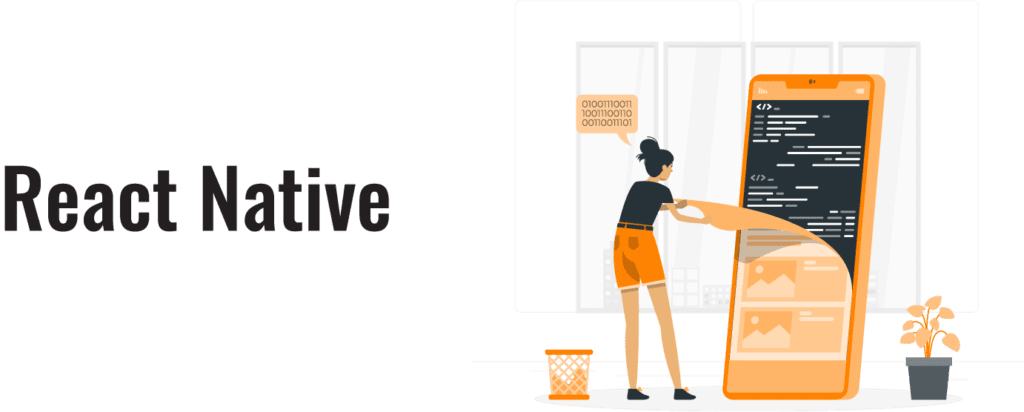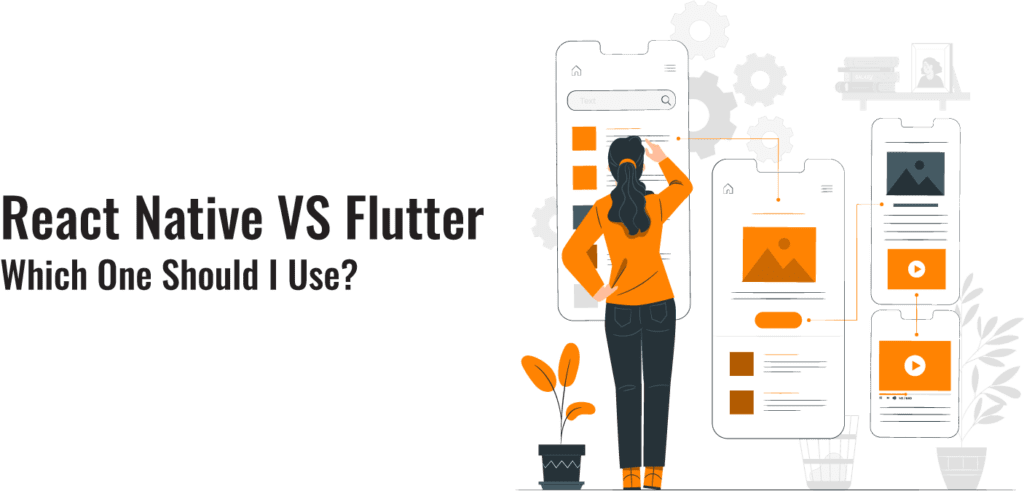With the growing demand for mobile applications, developers continuously look for better and faster frameworks. They want to make apps quickly by without any complications. Cross-platforms are gaining popularity such as React Native VS Flutter, offer high-end features to design apps efficiently.
Building versatile cross-platform applications is moving nowadays. Would you like to create applications on a rapid basis? Also, you want to lessen cross-platform development costs – yet you don’t know which innovation to pick.
You can drive growth and innovation with expert mobile app development services.
In this article, VirtueNetz looks at the leading market players, React Native VS Flutter. You can recognize which system is best for your application thought from the application proprietors’ viewpoint.
However, both are powerful and come with some pros and cons. You need to identify their characteristics and your business needs in detail to pick the suitable one.
React Native

- About React Inventor: Facebook is the initiative hub that creates the React Native application Language.
- React Native Introduction: React Native is composed totally in JavaScript utilizing React.
- The benefit of learning React Native: It’s an immense advantage for React Native since JavaScript comes in the list of most used and popular languages on the planet.
- How easy is it to learn React Native?: JavaScript has an international following because developers crave to work with friendly language.
Discovering designers to code in JavaScript is simple and consequently. Learning about React Native applications is straightforward for any JavaScript engineer.
Respond Native is a feasible platform for:
- Cross-framework advancement
- Platform to make versatile mobile applications utilizing JavaScript
- Creating apps for Android and iOS utilizing one codebase
- Utilizing a similar plan to React
A short history of React Native:
- In 2013, the Facebook hackathon – React Native began for a personal Facebook project
- In 2015, React.js Conference – React Native 1 Preview disclosed
- In 2015, the F8 Conference – Official Launch of React Native
- Facebook pronounces React Native ‘open for use and accessible on GitHub
- React Native Applications
- Instagram (IOS, Android)
- Facebook (IOS, Android)
- Fb Ads Manager (IOS, Android)
- Pinterest (IOS, Android)
- Skype (IOS, Android)
- Tesla (IOS, Android)
- Bloomberg (IOS, Android)
- com (IOS, Android)
An essential secret of Native React:
By observing all the above sensitive points of React Native, two things are for sure: React Native application is more senior than Flutter and has a more incredible network. Also, the Facebook group has spent a lot of time settling the API just as a spotlight on fixing hidden issues.
Flutter

- About Flutter: Flutter is a convenient UI toolbox. As such, a far-reaching Google application Software Development Kit has all the gadgets and tools.
- Flutter Introduction: Flutter is a framework created by Google that works with Dart programming language to React Native.
- Advantages to Learn Flutter: Flutter is the latest framework to develop great and natively compiled desktop, web, and mobile applications. A significant advantage of using this language is that you do not need a bunch of code to create an actual native application.
- How easy is it to learn Flutter?: Compared to other frameworks such as Java, Swift, and React Native applications, Flutter is easy to use and learn.
With Dart, one can easily set up or install Flutter on Windows, Mac, and Linux. There is no excessive coding, and you need to learn the basics of Dart to complete the development process.
How is Flutter helpful language?
Using Flutter is Beneficial Because of the Following Reasons:
- Same logic and UI in all platforms
- No Excessive Coding
- Similar to Native App Performance App
- A simple framework and consistent implementation of logic
- A great potential to go beyond mobile
A history of Flutter is:
- First beta release for Butter on Feb 2018
- Release of Flutter beat 2 and 3, Google I/O – April 2018-May 2018
- Flutter Preview 1 and 2 release – June 2018 – September 2018
- Since December 2018, Flutter has been the most stable and ready for production
- February 2019 – September 2019, Flutter 1.2 – 1.9 release
- Since December 2019, it has provided support for both desktop and web
- Flutter Applications
- Xianyu App by Alibaba (IOS, Android)
- Google Ads App (IOS, Android)
- Hamilton App (IOS, Android)
- JD Finance App (IOS, Android)
- Reflect (IOS, Android)
- Topline App (IOS, Android)
Important Secret of Flutter:
Flutter is an excellent app for mobile app development that works with user-friendly APIs. With this language, you need to write code one time in Dart. To run on different platforms than its counterparts, Flutter controls every pixel on the screen.
Comparison of React Native VS Flutter Top Factors to Consider

Without a doubt, both cross-stage structures have their advantages and restrictions. Yet, these advancements are leaving many of you with considerable difficulty. The question is, which system best accommodates your application thought?
React Native and Flutter are almost the same kind of platforms: structure cross-stage applications utilizing one codebase, vital reloading, great UI, excellent tooling, and domestic highlights. Flutter outperforms React Native by a small margin of 4 percentage points (42% for Flutter and 38% for React Native).
Both technologies are quite popular, though. Yet, different sources show varying views on their overall popularity. Learn more about the in-depth comparison of React Native VS Flutter.
Besides all these similarities, both languages have a few distinctive points.
We should investigate React Native versus Vacillate against all factors; let’s start the exploration.
| FLUTTER | REACT NATIVE | |
| Developed By | Flutter is a new framework backed by Google. One can create applications for IOS and Android by using this setup. | Reactive Native is an open-source created by Facebook through which you can make incredible apps. |
| Formation | Entirely composed in JavaScript which is a huge benefit. This language is consistently used and ranked in the programming world. | Work with native UI components of the operating system. |
| Learning | Developers with a background in C++/Java can easily learn and use Flutter than JavaScript developers. | Any JavaScript developer can use or learn this language quickly and easily. |
| Performance | The Functionality and usage of the flutter are less complex than React Native. By compiling Dart and C/C++ libraries, it performs faster than native code. | React Native uses JavaScript as a programming language that cannot be strongly typed. The use of JavaScript bridge to interact with native components make it a little bit complex. |
| Components | UI widgets and library of plugins. | The installation and configuration of this language are simple. With Node JS and Yarn installed as a package manager, you can easily install React Native with the command line. |
| Ecosystem | Google is giving great attention and investing heavily to upgrade its ecosystem. New packages are constantly being launched and surely the framework is moving forwards to possess the best ecosystem. | This language has the richest ecosystem as it is more mature than the flutter. Because of this, many big companies use this. |
| Adaptation | The adaptation rate of Flutter is improving constantly. Many apps such as Google ads, Hamilton music, Xianyu App by Alibaba, and many others are using this framework to develop applications. | Being mature and rich in features, many big companies are using Reactive Native such as Uber, Facebook, Instagram, Skype, Tesla, and more. |
| Installation and Configuration | Flutters need binary for specific mobile platforms. You can then install this and add it to the PATH variable. Luckily, you can do this with the command line. | Because of the JavaScript bridge, one can create the look and feel of native applications of IOS and Android. However, the behavior of React Native components can vary on different platforms. |
| Ranking | Flutter is ranking higher with 75.4%. | React Native is ranking with 62.5%. |
| User Interface | Flutter with its UI widgets can create applications similar to native apps. Even, developers do not need third-party libraries and it remains consistent on all platforms. | As react Native was developed in 2015 and gaining support from developers since that time. So, it has a large number of contributors and community support. |
| Community Support | At present, the community support for flutter is not so vast because it is a new framework. Thus, its support and contributors are accelerating steadily. | At present, the community support for Flutter is not so vast because it is a new framework. Thus, its support and contributors are accelerating steadily. |
React Native VS Flutter: Which One Should I Use?

Both the frameworks, React Native VS Flutter, are incredible and provide great support while developing high-end applications. After comparing both, we get to know that Reactive Native is a mature language that offers superb community support. But, it isn’t straightforward to use because of JavaScript Bridge.
On the other hand, the Flutter application offers more efficiency, customizable widgets, and is easy to use because of the Dart language many developers use. However, it has certain limitations despite its recent launch.
So, we can say that if you have a team of expert JavaScript developers, you must go with the React Native framework. On the other hand, if you are familiar with Dart and need highly tailored and striking designs with less complexity or excessive coding, Flutter is a great choice.






